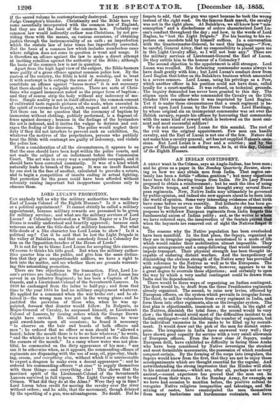LORD LUCAN'S PROMOTION.
CAN anybody tell us why the military authorities have made the Earl of Lucan Colonel of the Eighth Hussars ? Is it a military or a political appointment ? It cannot strictly be called a military appointment, because military rewards are presumed to be given for military services ; and what are the military services of Lord Lucan? A Colonelcy bestowed on a William Napier or a De Lacy Evans is readily understood and heartily approved ; because such veterans can show the title-deeds of military honours. But what title-deeds of a like character has Lord Lucan to show ? Is it a political sop ? Can it be said that he lost the Light Brigade in the valley of Balaklava, and that somebody found a Colonelcy for him on the Opposition-benches of the House of Lords ? It is not for us to blame Lord Lucan for accepting this sinecure. Of course he thinks his title good. But when the military author- ities quarter him on the public, and give him the same distinc- tion that they give unquestionable soldiers, we have a right to look into the matter, and see whether there are grounds warrant- ing this astonishing promotion.
There are two objections to the transaction. First, Lord Lu- can's services are insufficient. What are they? Lord Lucan has served in an Infantry Regiment ; he has been a Captain of Life Guards, and a Lieutenant-Colonel of the Seventeenth Lancers. In 1838 he exchanged from the latter to half-pay ; and from that time to theyear 1854 he had no military employment whatever. He applied for a command when the war broke out ; and he ob- tained it—the wrong man was put in the wrong place ; and he justified the prevision of those who, when he was ap- pointed, foresaw that disaster would follow. In Bulgaria, as Major-General of Cavalry, he surpassed himself, as Lieutenant- Colonel of Lancers, by issuing orders which Sir George Brown might have envied. He called upon the officers to wear gold sword-knots upon all occasions ; he found it necessary " to observe on the hair and beards of both officers and men "; he ordered that no officer or man should be "allowed a beard; below the mouth there is to be no hair whatever," he wrote, " and the whisker is not to be worn more forward on the chin than the corners of the mouth." In a camp where water was not plen- tiful, he commented on the dirty appearance of his men : " nor can it be otherwise when, as it appears, the commanding-officers of regiments are dispensing with the use of soap, oil, pipe-clay, black- ing, croom, and everything else, without which it is unreasonable to expect a dragoon to make even a decent appearance ": and he ordered his commanding-officers " at once" to supply themselves with these things—and everything else ! This shows that the martinet spirit of the Lieutenant-Colonel of the Seventeenth Lancers survived in full vigour. The Light Cavalry went to the Crimea. What did they do at the Alma ? Were they up in time ? Lord Lucan takes credit for moving the cavalry over the river without orders; and he adds, that the movement, though delayed by the upsetting of a gun, was advantageous. No doubt. But he forgets to add, that the gun was upset because he took the wrong instead of the right road. On the famous flank march, the cavalry was not in the right place. At Balaklava, we all know how " mis- conception" and a disobedience of orders characterized Lord Lu- can's conduct throughout the day ; and how, in the words of Lord Raglan, he "lost the Light Brigade." For his bearing to his su- periors one anecdote told by himself suffices. In a conversation with the Quartermaster-General, he used this language—" Now, be careful, General Airey, that no responsibility is placed upon me in this Light Cavalry affair, as I will not bear any." These are the military services of Lieutenant-General the Earl of Lucan. Do they entitle him to the honour of a Colonelcy?
The second objection to the appointment is still stronger. Lord Lucan was recalled. His forbearing commander seems always to have dealt gently with him; but Lord Lucan's conduct drew from Lord Raglan that letter on the Balaklava business which amounted to a severe censure. Lord Lucan, using his privilege as a Peer, which another officer in his position could not have done, called loudly for a court-martiaL It was refused, on technical grounds. The inquiry demanded has never been granted to this day. The stigma upon the officer who commanded the Cavalry on the 25th October 1854 remains where it was imprinted by Lord Raglan. Yet it is under these circumstances that a crack regiment is be- stowed upon Lord Lucan by the Horse Guards. Lord Hardinge, by whose original sin an incompetent commander was set over the British cavalry, repeats his offence by honouring that commander with the same kind of reward which is bestowed on the most emi- nent and most successful soldiers!
We do not censure Lord Lucan for this scandal. The root of the evil was the original appointment. Few men can handle cavalry, and the Earl of Lucan is not one of the few. Nature did not make him a cavalry general; art has not supplied Nature's omis- sions. But Lord Lucan is a Peer and a courtier ; and -by the grace of Hardinge and something more, he is, at this day, Colon l of the Eighth Hussars.


































 Previous page
Previous page